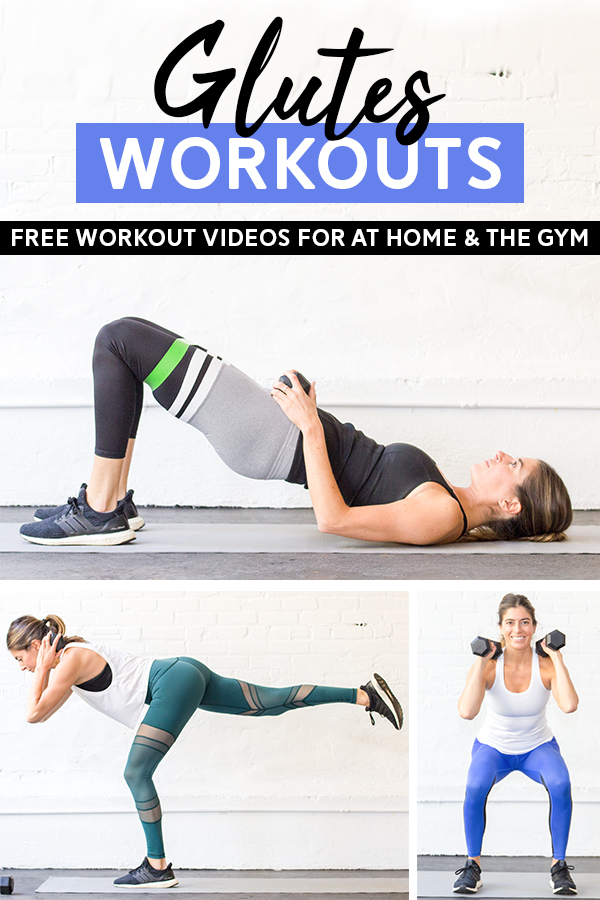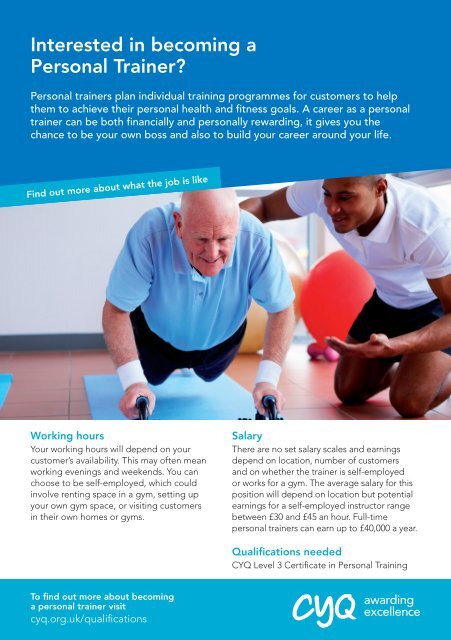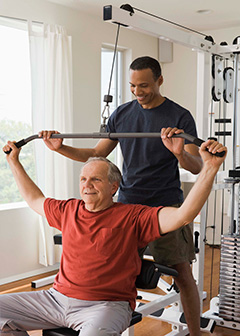
Atlanta, GA has many opportunities for personal trainers. Personal trainers plan a routine for clients, and they teach correct form and posture when exercising. Others also offer advice on nutrition and sleep habits. A Personal Trainer's goal is to help clients achieve their fitness goals.
Average base salary
Atlanta is a great place to work as a personal trainer. In fact, the city ranks as one of the top cities to work as a Personal Trainer. Atlanta offers a high quality of life and excellent salaries. This city is perfect for both experienced and new trainers. To make a decent income as a Atlanta Personal Trainer, you will need to have the proper training.

The salaries of personal trainers in Atlanta, GA are between $18,319 and $101,573 each year. In 2018, the average base salary for a Personal Trainer in Atlanta, GA is $51,879 per year. This means that the average tax burden is 22%, and Georgia's state tax is 6%. This would leave a take home pay of $42,310 per year or $1,763 per paycheck.
Total cash compensation
Atlanta personal trainer jobs are available at different levels of pay. These positions are paid an average of $21,836, with some earning more. There are also positions such as Principal Trainer, Diversity Trainee, and Technical Instructor. You may also find personal trainers in schools and non-profit organizations.
These data are based only on bi-monthly payroll periods. It also includes federal and state tax rates. However, it is important to note that tax rates can vary by jurisdiction. This information does not represent a comprehensive salary guide, nor a recommendation for a particular salary. It is only a rough guide to potential salaries and should be used as a general guideline.
Independent contractors often set their own rates. Some people charge $100 to $150 per hour, while others only charge $40. The pay can vary widely depending on the type of employment and the area.

Working hours
Personal trainer jobs in Atlanta may be a good choice for someone looking for a rewarding career. The duties of a personal trainer involve designing and executing an effective exercise program for their clients. While clients engage in exercise, this includes teaching them proper form, posture, and nutrition. A personal trainer can also help clients with their sleep habits and nutrition needs. Based on the goals of each client, a personal trainer will develop a program to meet their needs.
FAQ
What does caffeine do to my sleep?
Caffeine effects how fast it takes to fall asleep and how much sleep you get. Caffeine can cause drowsiness that makes falling asleep much easier. However, caffeine can keep you awake longer and make it more difficult to fall asleep. Drinking coffee or energy drinks before bedtime is a bad idea.
What are resistance training exercises?
Resistance training includes using weights and other objects to perform specific movements. Lifting weights helps strengthen your arms, shoulders, chest and back, as well as your legs, hips, and core. Resistance training promotes strength, muscle mass, and bone density.
When I exercise, should I consume alcohol?
Drinking alcohol is high in calories so it's best to not consume too much while working out. It is possible to increase your endurance by drinking moderate amounts of alcohol (one glass per day). It may reduce fatigue and muscle soreness from intense exercise.
What does exercise do for your body?
Exercising helps you lose weight, build muscle mass, increase energy levels, reduce stress, and improve sleep quality. Exercise is good for your mood, self-esteem, productivity, and heart health.
Is it safe?
Outside exercise is encouraged whenever possible. The air temperature isn't the only factor determining whether it's safe to exercise outdoors. Wind speed, humidity, precipitation, and visibility also play a role. Wear layers of clothing to keep you dry from rain and windchill when you exercise outside in inclement conditions.
Statistics
- Physical activity confers the following maternal and fetal health benefits: a decreased risk of pre-eclampsia, gestational hypertension, gestational diabetes (for example, 30% reduction in risk) (who.int)
- In high-income countries, 26% of men and 35% of women were insufficiently physically active, as compared to 12% of men and 24% of women in low-income countries. (who.int)
- According to the Centers for Disease Control and Prevention, chronic diseases cause 7 out of 10 deaths in the U.S., and treating chronic diseases accounts for 86% of U.S. healthcare costs. (mana.md)
- Globally, 28% of adults aged 18 and over were not active enough in 2016 (men 23% and women 32%). (who.int)
External Links
How To
How to Burn Belly Fats Faster
When we are trying to lose weight, belly fat is often seen as a problem. But if you think about it, Belly Fat is actually a good thing. Your organs will be protected by the amount of belly fat. Let's now see how to quickly lose belly fat.
Lack of exercise and stress are the main reasons we store body fat. Because of its stimulation of the production hormone cortisol, stress can make us feel hungry continuously. Cortisol can increase insulin levels in the blood. Insulin then stores excess calories as fat. Lack of sleep causes the release of adrenaline into our system, leading to increased appetite. These extra calories can be broken down by exercising.
There are many different ways to reduce bellyfat. All of these methods can be used, depending on your budget. Here are some quick tips to get rid of belly weight.
-
Eat less food. Instead of eating three large meals a day, eat smaller meals. You'll eat fewer calories this way.
-
Drink lots of water. Water flushes out toxins and keeps you hydrated. You won't overeat if you drink water before you eat.
-
Avoid unhealthy snacks. If you're looking for quick fixes, snack foods like chips, cookies, candies, etc. These tempting snacks might look appealing. These sweet treats can be tempting, but they are high in empty calories and sugar. Choose healthy options like whole grains, fruits, vegetables, nuts, seeds and nuts.
-
Three times per week, strength training is recommended. Strength training builds muscle mass that burns more calories, even when it is done while you rest. Strengthening your bones, muscles as well ligaments, joints, tendons, heart and lungs.
-
Regularly walk or stretch. Stretching helps to improve flexibility and mobility, which reduces back pain. Walking is great for burning calories, especially brisk walking for 30 minutes.
-
Reduce alcohol intake. Reduce alcohol intake. Alcohol is a waste of calories and has no nutritional value.
-
You can lose weight slowly. First, determine your current weight. Next, calculate your ideal weight by adding between 5% and 10% to your total body weight. Once you have established your ideal weight, reduce your daily calorie intake by 500 to 1000 calories each day until you achieve your goal.
-
Avoid processed foods. These foods are high-in salt, sugar, as well as preservatives. Although they are convenient, processed foods don't have enough nutrients to sustain your health.
-
Don't skip breakfast! Breakfast improves concentration, memory, energy, and stamina. Breakfast should include protein (like eggs), fiber (like oats), and complex carbohydrates (like oatmeal).
-
Have regular bowel movements. Constipation and irregularity cause bloating and gas. Increase your fiber intake and drink lots of water.